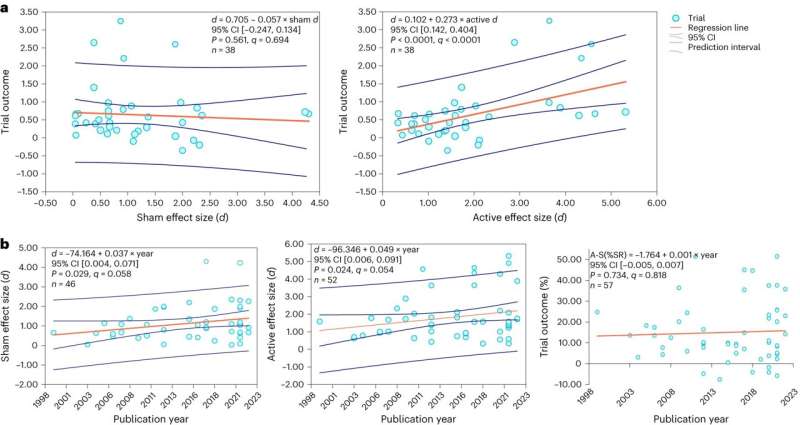September 28, 2023 report
This article has been reviewed according to Science X's editorial process and policies. Editors have highlighted the following attributes while ensuring the content's credibility:
fact-checked
peer-reviewed publication
trusted source
proofread
Placebo effect found to be growing stronger for transcranial magnetic stimulation therapy used for depression

A team of medical researchers from Shanghai Jiaotong University School of Medicine, Central South University and the Second Affiliated Hospital of Anhui Medical University, all in China, has found evidence suggesting that the placebo effect has grown stronger in trials of transcranial magnetic stimulation therapy for patients treated for depression.
In their study, reported in the journal Nature Mental Health, the group analyzed data from prior research efforts focused on testing the effectiveness of transcranial magnetic stimulation therapy.
Prior research has shown that the placebo effect—where a patient is given a "sham" medication or therapy to treat an ailment instead of a real one—can be an effective means of treating some conditions. And while the means by which the placebo effect works is not understood, it has been shown to alleviate symptoms in some people.
Prior research has also suggested that the placebo effect might be growing stronger in recent years—tests with placebo pills are now providing even more benefits than those that were used in the past. Why this may be the case is not known, though some in the psychiatry field have suggested it is due to an increase in trust in the psychiatry profession.
In this new effort, the researchers wondered if a similar increase might be observed with transcranial magnetic stimulation therapy.
In transcranial magnetic stimulation therapy, a device is attached to the head of a patient as a means of applying a magnetic field to desired parts of the brain. This may stimulate neuronal activity, resulting in reduction in depression symptoms. Such therapy is conducted in a repetitive manner over the course of several months.
To find out if a placebo effect might be growing stronger with transcranial magnetic stimulation therapy, the research team studied data from two trials that were involved in testing the effectiveness of the therapy technique; one conducted over the years 1999 to 2007, the other from 2018 to 2022. Both involved the traditional therapy and a control, where a device was attached to the patient's head but no magnetic stimulation was applied.
Both teams had found during their respective trials that the placebo effect worked almost as well as the real therapy. In comparing the two trials, the research team found that the placebo effect was stronger in the second trial, suggesting it was growing stronger over time. The researchers suggest that the increase was likely due to a stronger belief by patients that the therapy was going to help them.
More information: Yangting Xu et al, Growing placebo response in TMS treatment for depression: a meta-analysis of 27-year randomized sham-controlled trials, Nature Mental Health (2023). DOI: 10.1038/s44220-023-00118-9
© 2023 Science X Network


















